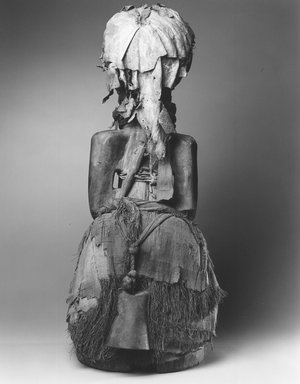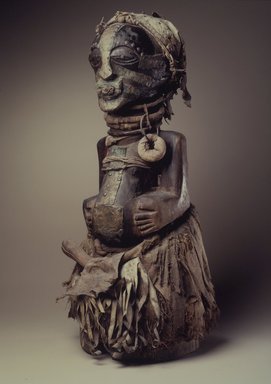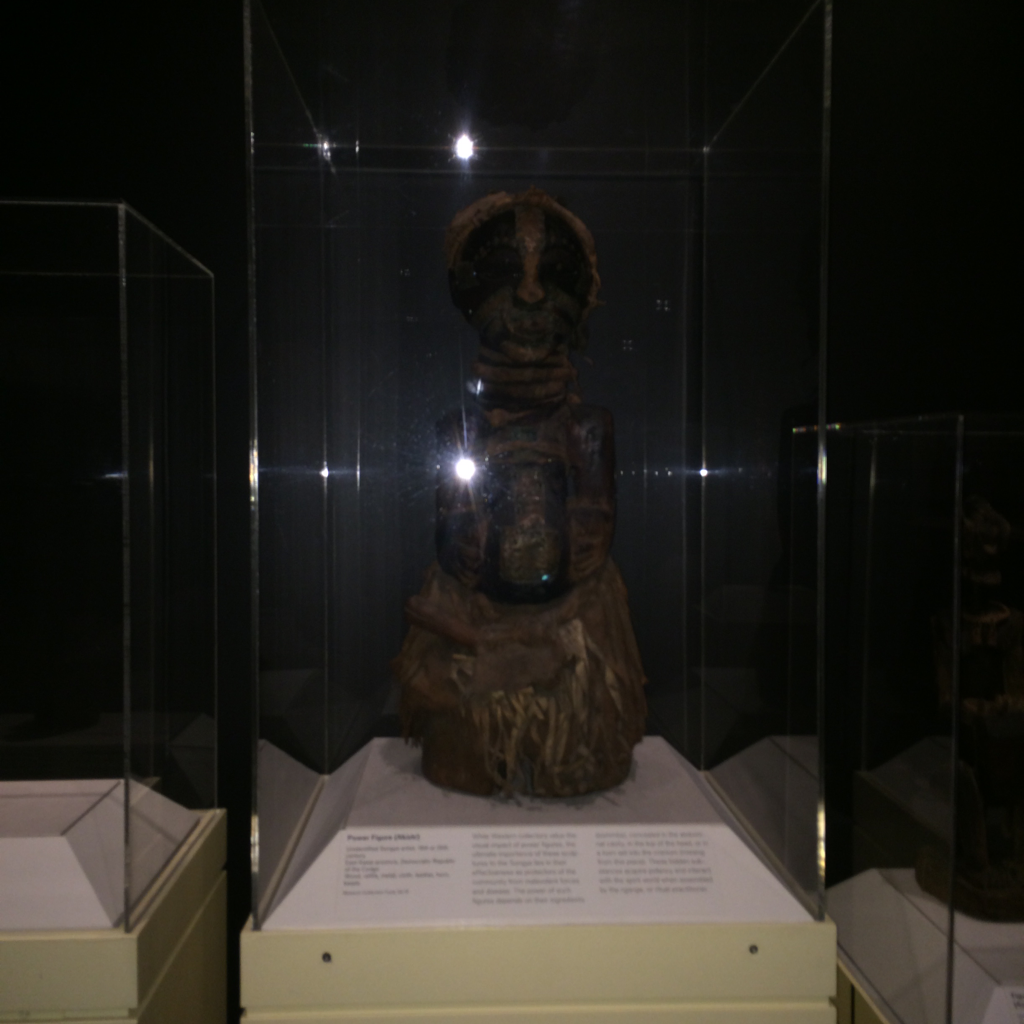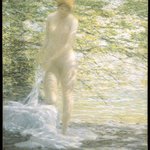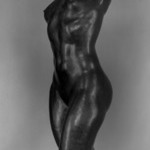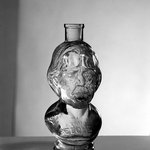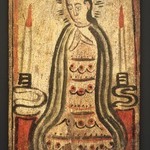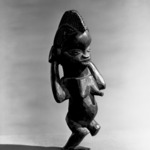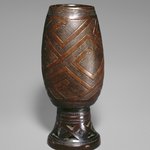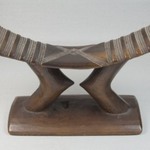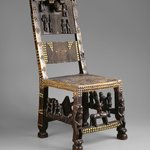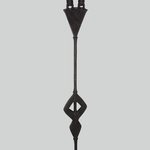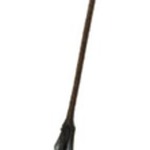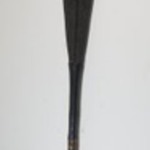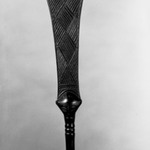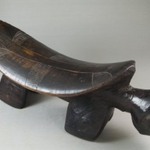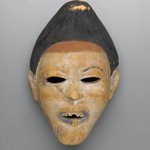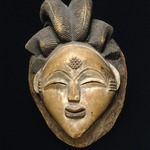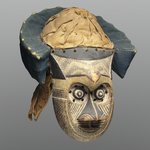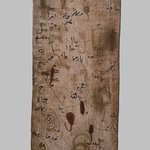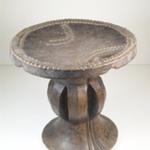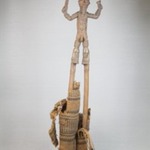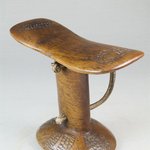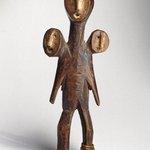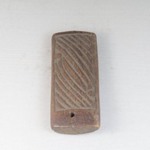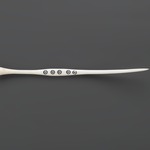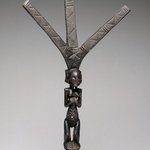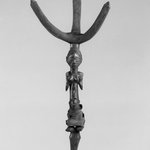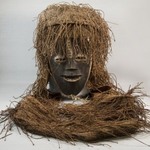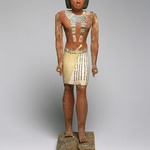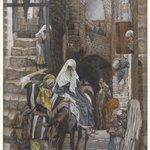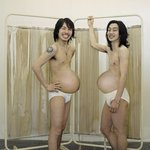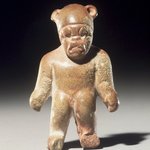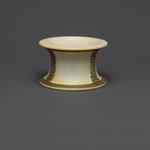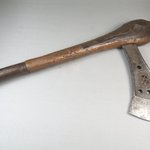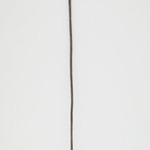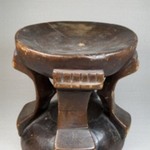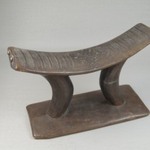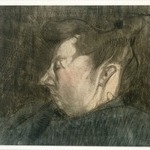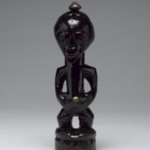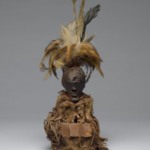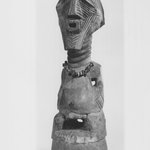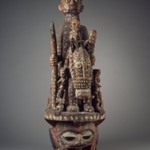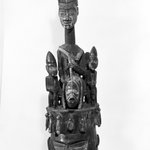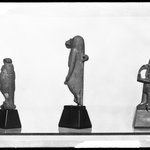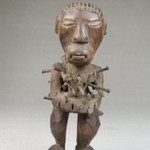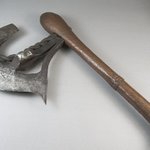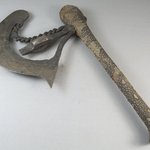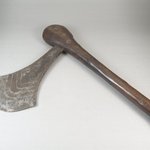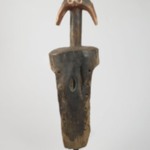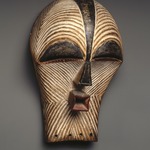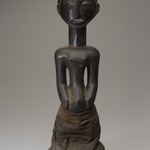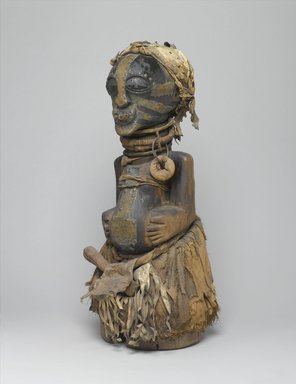

Songye. Power Figure (Nkishi), late 19th or early 20th century. Wood, raffia, metal, cloth, leather, horn, beads, 30 x 12 x 14 3/4 in. (76.2 x 30.5 x 37.5 cm). Brooklyn Museum, Museum Collection Fund, 50.79. Creative Commons-BY (Photo: Brooklyn Museum, 50.79_threequarter_PS1.jpg)

Songye. Power Figure (Nkishi), late 19th or early 20th century. Wood, raffia, metal, cloth, leather, horn, beads, 30 x 12 x 14 3/4 in. (76.2 x 30.5 x 37.5 cm). Brooklyn Museum, Museum Collection Fund, 50.79. Creative Commons-BY (Photo: Brooklyn Museum, 50.79_profile_PS2.jpg)
Power Figure (Nkishi)
Arts of Africa
While Western collectors value the visual impact of power figures, the ultimate importance of these sculptures to the Songye lies in their effectiveness as protectors of the community from malevolent forces and disease. The power of such figures depends on their ingredients (bishimba), concealed in the abdominal cavity, in the top of the head, or in a horn set into the cranium (missing from this piece). These hidden substances acquire potency and interact with the spirit world when assembled by the nganga, or ritual practitioner.
CULTURE
Songye
MEDIUM
Wood, raffia, metal, cloth, leather, horn, beads
DATES
late 19th or early 20th century
DIMENSIONS
30 x 12 x 14 3/4 in. (76.2 x 30.5 x 37.5 cm)
(show scale)



COLLECTIONS
Arts of Africa
ACCESSION NUMBER
50.79
CREDIT LINE
Museum Collection Fund
CATALOGUE DESCRIPTION
Wooden figure with large head, protruding abdomen and no visible feet. The arms are at sides, hands holding belly. The figure is covered with numerous additions: a bandana-style headdress of animal skins hangs down the neck. A rope with amulets circles the head, while the neck holds five bands of various materials and thicknesses. One of these supports two interlocked rings: one of metal, the other a doughnut shaped padded leather (?) ring. The chest is surrounded by five thin twisted ropes. A voluminous skirt covers the lower torso. Many-layered cloth and leather strips, wooden dowels and a metal bell are suspended from a heavy, twisted belt. The front of the torso shows two thin metal rectangles protecting materials inside the abdominal cavity. They are nailed into place. The same technique is used on the face to decorate the nose and forehead. Tooled leather (?) strips decorate cheek and chin. Eyebrows are outlined with nail heads above large heavy-lidded eyes. The pursed mouth shows protruding organic material.
EXHIBITIONS
MUSEUM LOCATION
This item is not on view
CAPTION
Songye. Power Figure (Nkishi), late 19th or early 20th century. Wood, raffia, metal, cloth, leather, horn, beads, 30 x 12 x 14 3/4 in. (76.2 x 30.5 x 37.5 cm). Brooklyn Museum, Museum Collection Fund, 50.79. Creative Commons-BY (Photo: Brooklyn Museum, 50.79_threequarter_PS1.jpg)
IMAGE
threequarter, 50.79_threequarter_PS1.jpg. Brooklyn Museum photograph, 2007
"CUR" at the beginning of an image file name means that the image was created by a curatorial staff member. These study images may be digital point-and-shoot photographs, when we don\'t yet have high-quality studio photography, or they may be scans of older negatives, slides, or photographic prints, providing historical documentation of the object.
RIGHTS STATEMENT
Creative Commons-BY
You may download and use Brooklyn Museum images of this three-dimensional work in accordance with a Creative Commons license. Fair use, as understood under the United States Copyright Act, may also apply.
Please include caption information from this page and credit the Brooklyn Museum. If you need a high resolution file, please fill out our online application form (charges apply).
For further information about copyright, we recommend resources at the United States Library of Congress, Cornell University, Copyright and Cultural Institutions: Guidelines for U.S. Libraries, Archives, and Museums, and Copyright Watch.
For more information about the Museum's rights project, including how rights types are assigned, please see our blog posts on copyright.
If you have any information regarding this work and rights to it, please contact copyright@brooklynmuseum.org.
RECORD COMPLETENESS
Not every record you will find here is complete. More information is available for some works than for others, and some entries have been updated more recently. Records are frequently reviewed and revised, and we welcome any additional information you might have.
